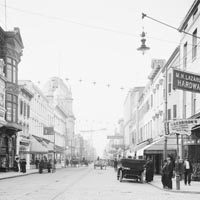


While visiting cities around the country (and the world), we are always on the lookout for uniquely local shops that embody the spirit of a place.
Bookshops can be a good bet, especially in college towns. Famous spots such as Shakespeare and Company in Paris, or City Lights in San Francisco feel almost cliche’. But, get a little off the beaten track and you often find true gems. Oxford, Mississippi boasts Square Books, and Denver, the Tattered Cover. Blue Bicycle Books is Charleston’s bookshop stop, and features a fine selection of local fare alongside new and slightly used (and some rare) books.
Arts and crafts are often a harbinger of local traditions and cultures. Charleston’s sweetgrass baskets (more here) are a prized art form that demonstrates a link to the region’s rice culture using native plant materials. One family vacation uncovered Family Heirloom Weavers in York, Pennsylvania, where vegetable-dyed cotton is woven on reclaimed looms in patterns largely from the early 19th century. The Southern Highland Guild – Folk Art Center, near Asheville, is a frequent stop on mountain journeys for pottery and wood crafts. A box of hand-tied flies from Dan Bailey’s Fly Shop in Livingston, Montana, and snap-front western shirts from Denver’s Rockmount Ranch Wear represent the legacy of larger-than-life personalities who opened their own businesses catering to locals starting in the 1930s.
Many of Charleston’s own legacy businesses originated on King Street, with a few surviving in spite of rising real estate values, changing demographics, or a lack of interest among the younger generation to carry on in the family enterprise. Among those still going strong after over 100 years in business are: Croghans Jewel Box, Berlin’s for Men, and Bluestein’s Mens Wear.
In Spring 2013, Dr. Dale Rosengarten taught a class entitled “King Street as a Classroom” at the College of Charleston (a Charleston City Paper article on this course and more can be found here). The students researched King Street’s businesses, selecting buildings, digging into their histories, and interviewing those who were living who might offer some individual insights into the business histories. During the course, a panel of King Street merchants, shopkeepers, or their children, was convened at the College’s Jewish Studies Center to share stories of their family businesses. Attendees were treated to personal experiences of how the businesses evolved, how they survived during the Depression, and how they dealt with obstacles ranging from fires to hurricanes. The story of immigrants selling wares and services from peddler carts until they could afford a “bricks and mortar” establishment seems like a version of where things stand today in many parts of the city.
Many other locally owned, independent businesses, if they did not buy their building years ago, are finding it more difficult to match the rents that would be paid by restaurants or national chain stores. Residents need neighborhood services and businesses, like dry cleaners, corner groceries, shoe repair shops, and hardware stores, but, the future of these kinds of businesses located near the neighborhoods that would benefit from them is questionable.
Local business advocate Lowcountry Local First, in collaboration with some in the development community as well as If You Were Mayor, has been pondering some possibilities to counter the likelihood of losing core local businesses in downtown. Models from other communities include local business districts and landlord incentivization. Other concepts are sidewalk kiosks and creating more opportunities for mobile selling. In some cities you will find a selection of curated items inside restaurants. Two Boroughs Larder is an example of this model and suggests there might be more options for collaborative business opportunities in other locations in the city.
Creative ideas can keep the city livable by fostering small and independent businesses so that they can coexist among the national retailers that risk dominating shopping districts. The reality is that residents need a spectrum of businesses to support their communities. And, it is these unique businesses that provide unique and character-defining experiences throughout the city.
Look for this to be on the agenda at the mayoral forum scheduled for September 30 at the Charleston Music Hall. Details will be posted on Facebook and through our newsletter which you can sign up below.